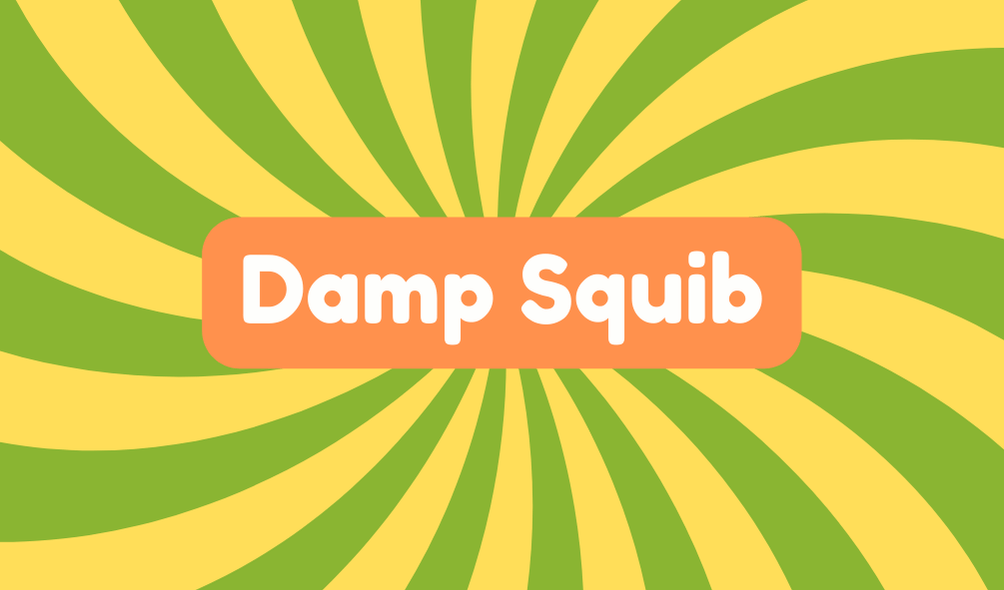"Damp squib" refers to something that disappoints, like a fireworks display that fizzles instead of impressing the audience. The phrase dates back to the 1500s, originally describing weak explosions. It gained popularity in British English by 1837 and now applies broadly to any situation where expectations fall flat. For example, you might say your birthday party felt like a damp squib due to last-minute cancellations. This term captures the essence of unmet hopes, resonating in today's discussions about failed events and cultural sentiments. If you're curious about its usage and relevance in everyday language, there's more to explore.
Synonyms
If you're looking for ways to express a sense of disappointment similar to "damp squib," there are several synonyms you can use. Here are three related expressions that capture the emotional impact of unmet expectations:
- Wet blanket – It describes someone who quashes excitement or enthusiasm.
- Buzzkill – A modern term for a person or thing that ruins joy in social situations.
- Killjoy – A classic way of describing someone who spoils the fun.
Using these expressions broadens your vocabulary and helps you articulate feelings of disappointment more precisely. Each term conveys a unique nuance while underscoring how enthusiasm can be dampened, much like a firework that fizzles instead of igniting excitement. Embrace these words to convey your sentiments effectively!
Example of Sentences
To illustrate how "damp squib" can manifest in everyday situations, consider some example sentences that showcase its usage:
- The birthday party everyone hyped about felt like a damp squib when half the guests canceled at the last minute.
- She expected the concert to be a thrilling experience, but it turned out to be a damp squib, with the band performing half-heartedly.
- His grand plans for the weekend fizzled into a damp squib after the rain ruined all outdoor activities.
These damp squib examples reflect the gap between anticipation and reality, a theme prevalent not only in casual conversations but also in literature, where characters often encounter similar disappointments. Understanding this phrase enriches our language and helps us articulate feelings of letdown more precisely.
Origin
The term "damp squib" has its origins dating back to the 1500s, where it initially described fireworks that produced weak, underwhelming explosions. This expression emerged from a historical context where damp squibs failed to ignite due to moisture. Over time, its linguistic evolution turned it into a metaphor for any situation falling short of expectations.
Here's a snapshot illustrating its journey:
| Historical Context | Linguistic Evolution |
|---|---|
| Refers to damp fireworks | Used to note disappointments in various situations |
| First recorded in 1837 | Widely recognized in British English |
| Associated with letdowns | Used metaphorically beyond pyrotechnics |
| Still lesser-known today | Reflects broader societal themes of expectation vs. reality |
This often serves as a reminder to temper our excitement with realistic expectations.
Collocations
Several common collocations enhance the understanding of "damp squib," illustrating its broad application in language. By examining these phrases, you can grasp how disappointment pervades various contexts. Here are some key collocations to contemplate:
- Damp squib events – These emphasize the gap between expectation and reality, highlighting how plans can fizzle out unexpectedly.
- Damp squib reactions – These capture the feelings of letdown when outcomes don't match enthusiasm, often seen in social settings.
- Damp squib moments – Reflecting instances where excitement falls flat, these moments can resonate with many of your experiences.
How to Use in Everyday Language
Using "damp squib" in everyday language can add a vivid touch to your conversations. You can aptly describe a disappointing date as a damp squib in relationships, capturing that letdown we all face. It's a phrase that starkly conveys your feelings without being overly dramatic. In celebrations, you might point out how a long-awaited party turned into a damp squib when few friends showed up, leaving you feeling deflated. Integrating this term allows you to express disappointment effectively, while also engaging your audience with a fresh metaphor. Remember, using "damp squib" offers a critical lens, encouraging others to reflect on expectations versus reality. Get ready to enhance your dialogue with this impactful phrase!
Why Is It Still Relevant Today?
Many people find the phrase "damp squib" relevant today because it perfectly captures the disappointment often felt in various situations. In a world aiming for innovation, our cultural perceptions still grapple with unrealized expectations. From highly anticipated events that flop to product launches that miss the mark, you witness the modern usage of this idiom everywhere. It's an astute reminder of how dreams can fizzle out, leaving you underwhelmed. This phrase resonates deeply, emphasizing the gap between societal hopes and reality. As you navigate life's ups and downs, you'll find "damp squib" articulates your frustrations, encouraging critical thinking about what truly matters. Recognizing this expression's significance helps you better understand your emotional landscape amidst contemporary letdowns.







